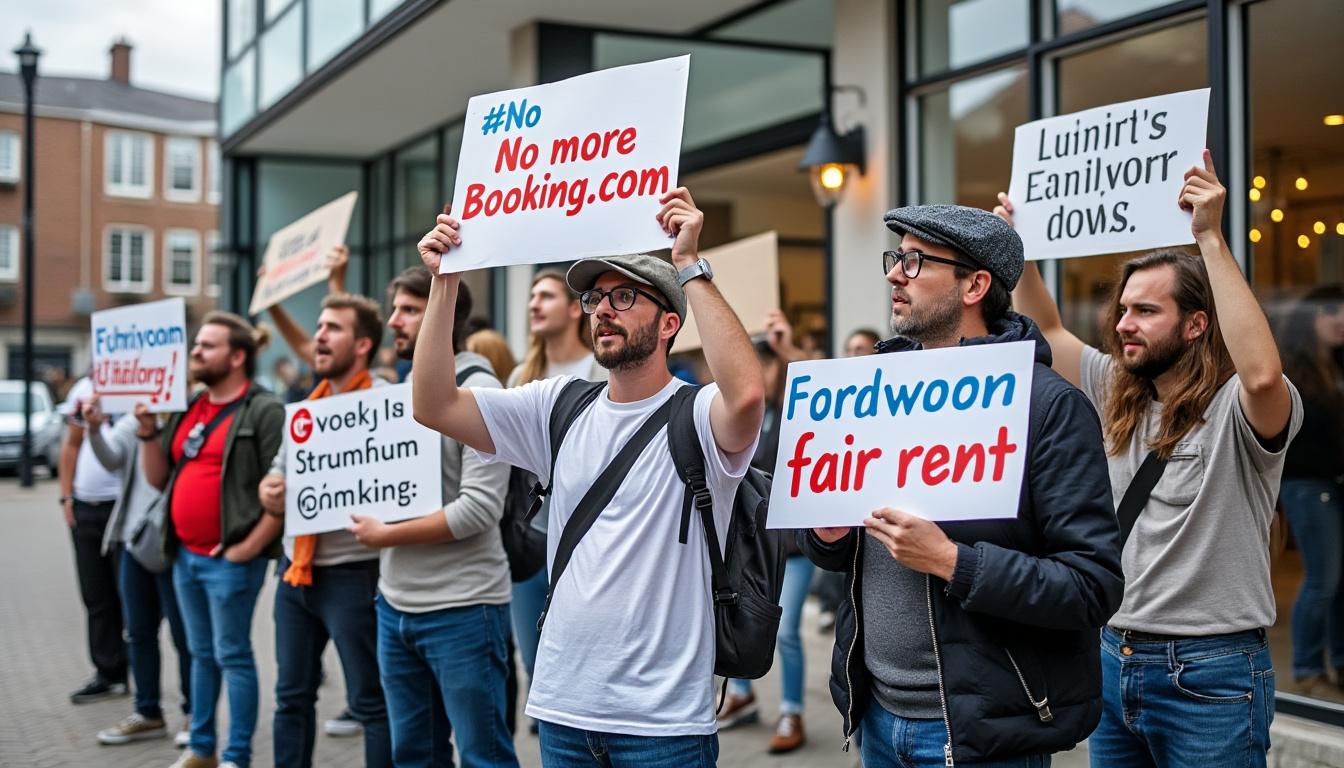The evolving landscape of short-term rentals in Europe has reached a boiling point, as nearly 130,000 landlords in Spain have decided to take legal action against the online travel agency Booking.com. This unprecedented lawsuit is driven by allegations of unfair business practices, primarily concerning excessive commissions and the arbitrary removal of thousands of accommodation listings. With rising tensions between traditional housing markets and digital platforms, this legal clash is more than just a dispute over contracts; it reflects the complex dynamics shaping the future of short-term rentals across the continent.
Legal Action: A Collective Stand Against Booking.com
As Airbnb, Expedia, and other platforms have transformed the rental landscape, so too has the relationship between property owners and digital platforms evolved. The legal battle currently unfolding in Spain is a historic mobilization of landlords aiming to reclaim their losses and address grievances they feel are being overlooked. The collective nature of this lawsuit symbolizes a significant moment in which landlords have united for a singular cause against Booking.com’s alleged practices.

The Allegations: Excessive Commissions and Listing Removals
The crux of the issue lies in the claims that Booking.com has imposed excessive commission structures that undermine the profitability of landlords. Many property owners assert that these high commissions not only erode their earnings but also create a hostile environment for those trying to thrive in the competitive vacation rental market. According to the plaintiffs, these practices have forced many landlords to reconsider their online strategies or even withdraw from the market altogether.
Additionally, the decision by Booking.com to delist approximately 4,000 rental listings—without proper notification or justification—has further bred resentment among these landlords. This sudden action thrust many owners into financial distress, as they relied heavily on the income generated from these rentals. In many cases, these delistings compounded pre-existing challenges related to expenses such as mortgage payments and maintenance costs, amplifying the economic fallout.
Demands of the Landlords
The plaintiffs are seeking not only financial compensation for their perceived losses but also a re-evaluation of Booking.com’s business practices. Specific demands include:
- Reduction of commission rates to reflect fairer compensation for landlords.
- Transparency in the criteria used for listing properties on the platform.
- Enhanced communication protocols when changes to listings occur.
As the lawsuit progresses, the outcomes will undoubtedly impact not only landlords but also the broader relationship between digital platforms and property owners.
Impact of Digital Platforms on Housing Availability
The lawsuit against Booking.com does not occur in isolation; it occurs amid growing scrutiny of how short-term rental platforms affect housing availability in urban areas. Critics argue that services like Booking.com, Airbnb, and Vrbo contribute to housing shortages by transforming valuable long-term rental housing into lucrative short-term accommodations. This shift can lead to increased housing prices and reduced availability for local residents, exacerbating an already challenging situation in many cities.

Housing Crisis: The Role of Short-Term Rentals
The strain on housing markets has necessitated a critical examination of regulatory approaches to short-term rentals across Europe. Local governments are grappling with how to balance the benefits of attracting tourists with the need to maintain stable housing for residents. This ongoing debate invites questions about the responsibilities of platforms like Booking.com and how they might contribute to sustainable housing solutions.
Policy Responses and Local Regulations
As many cities are increasingly aware of the challenges posed by short-term rentals, stakeholders are implementing various regulatory measures aimed at mitigating the housing crisis. Some of these policy responses include:
- Establishing stricter licensing requirements for short-term rentals.
- Implementing caps on the number of nights a property can be rented short-term.
- Introducing additional taxes on short-term rentals to fund affordable housing initiatives.
The interplay between Booking.com and local regulatory frameworks presents an intricate challenge where both parties must navigate legal leadership, public sentiment, and market demands.
Economic Repercussions for Landlords: A Deepening Crisis
The economic implications for landlords embroiled in this legal battle extend beyond immediate financial losses. Many landlords argue that reliance on Booking.com and similar platforms exposes them to systemic vulnerabilities. The removal of listings—without compensation or prior notice—has thrust many into precarious financial positions, putting their properties and livelihoods at risk.
Understanding the Financial Landscape
The economic fallout has prompted landlords to reconsider their operational strategies. Key factors shaping this landscape include:
- The increasing need for diversified income sources.
- Greater emphasis on direct bookings to reduce reliance on third-party platforms.
- The requirement for robust financial planning to address potential disruptions.
This shift represents a significant evolution in how landlords approach their businesses, focusing increasingly on measures that can ensure stability in an unstable market.
Case Studies: Landlords in Distress
Personal anecdotes from landlords affected by Booking.com’s practices spotlight the human dimension of this crisis. Consider the case of Maria, a landlord in Barcelona, whose revenue dwindled after her property was abruptly removed from the platform. Facing foreclosure, she reflects on the outdated system governing short-term rentals and calls for accountability from companies like Booking.com.
These individual stories serve as poignant reminders of the broader impact of unfair practices within the rental market, as property owners navigate challenges that threaten their livelihoods.
Booking.com’s Response: Navigating Legal Storms
As the lawsuit unfolds, Booking.com finds itself at a crossroads. In recent public statements, the company has aimed to emphasize its commitment to fair business practices and transparency. There are high stakes for the platform, which must consider its public perception and operational efficacy as it manages mounting legal pressures.
Managing Public Relations and Legal Challenges
Booking.com is tasked with addressing various public relations and operational challenges as it navigates this complex situation. Strategies may include:
- Enhancing communication with impacted landlords to build trust.
- Reviewing commission structures to foster better relationships with users.
- Engaging with local policymakers to clarify and strengthen compliance efforts.
The effectiveness of these strategies will shape not just the outcome of the current lawsuit but the platform’s reputation and stability within the market.
Future Implications for Booking.com and Other Platforms
The impact of this lawsuit on Booking.com’s operations could lead to a ripple effect throughout the industry. If landlords emerge victorious, it may set a precedent for similar actions against other platforms, including Airbnb and Expedia. The outcomes of the proceedings will likely compel a reevaluation of business practices across the sector, forcing platforms to coexist more harmoniously with their users and local economies.
The Call for Sustainable Regulations in Short-Term Rentals
This legal confrontation poses a critical challenge regarding the necessity for balanced regulations governing the short-term rental market. As stakeholders from various sectors come together, there is a unified call for frameworks that support fair competition, consumer protection, landlord rights, and housing availability.
Collaborative Solutions: An Emerging Approach
The ongoing legal disputes underline a collective recognition among industry stakeholders, policymakers, and local communities of the urgent need for collaborative solutions. Suggested approaches include:
- Establishing industry dialogues that include all relevant stakeholders.
- Creating standardized compliance guidelines across regions.
- Developing innovative models to promote sustainable tourism without compromising local housing.
Long-term strategies that involve cooperation will be vital in addressing the multifaceted issues arising from the growing prominence of short-term rentals.
Economic and Social Repercussions Beyond the Lawsuit
The ramifications of the lawsuit against Booking.com extend far beyond the immediate legal context. Economic dynamics influenced by the outcome could reshape tourism revenues, local job markets, and the availability of housing. A prolonged struggle between the short-term rental platforms and regulatory bodies may heighten existing tensions, leading to reduced housing availability and increased social inequities.
As this legal action continues to unfold, the intersection of tourism, local economies, and housing stability will demand ongoing attention and collaborative efforts to navigate these complex issues moving forward.
